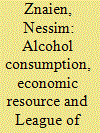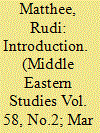|
|
|
Sort Order |
|
|
|
Items / Page
|
|
|
|
|
|
|
| Srl | Item |
| 1 |
ID:
183760


|
|
|
|
|
| Summary/Abstract |
Syria and Lebanon were declared French mandates by the League of Nations just after the First World War at the climax of a global prohibition, especially in the United States. Contrary to North Africa, Levant was already a great land of wine and arak production, especially through religious congregations. In that context, especially during the 1930s crisis, the French authorities were asked to protect and sustain the Lebanese vineyards, and more generally the alcohol levant economy. However, at the same time the administrators were pressured by Muslim lobbies and the League of Nations to ‘improve the social situation’ in the territories they had to manage, which could mean a stronger control of alcohol consumptions. In that context, alcohol regulation was a part of the paternal Republicanism that, according to Elizabeth Thompson, characterized the social policy of France in the Levant. How could the authorities manage these two different stakes? To try to answer, I have analysed the Lebanon newspapers from the nineteen-twenties in Saint-Joseph University and special issues on alcohol control, from French security services of the mandate, at the French Diplomatic Archives of Nantes (CADN).
|
|
|
|
|
|
|
|
|
|
|
|
|
|
|
|
| 2 |
ID:
183757


|
|
|
|
|
| Summary/Abstract |
In April 1920, few months after America’s implementation of Prohibition, several MPs of Turkey’s renegade Grand National Assembly in Ankara proposed a ban on the production, sale, import, and consumption of alcohol. Some MPs questioned the need to prohibit what Islam already forbade centuries earlier, but others stressed the medical, social, and moral imperatives for an injunction. After many contentious debates, the bill passed and remained law until 1924. This article adds to historical scholarship on the parliamentary passage of the ban through its interrogation of the American and Turkish non-state actors (NSAs) that worked towards this end. Following the passage of the US’s Eighteenth Amendment, leading Prohibition figures moved quickly to internationalize their agenda and created the World League Against Alcoholism in 1919. It became the principal American NSA to engage with Turkey’s emergent anti-alcohol interests; interests that coalesced into what became Yeşilay (the Green Crescent), which today is Turkey’s leading anti-addiction organization. Through analysis of American, Ottoman, and Turkish documents regarding both NSAs’ origins and various leading figures’ agendas, this study reveals the emergence of these relations while also identifying the plurality of agendas at play that exceeded simply mandating sobriety in lands of Ottoman and early republican Turkey.
|
|
|
|
|
|
|
|
|
|
|
|
|
|
|
|
| 3 |
ID:
183756


|
|
|
|
|
| Summary/Abstract |
Primarily proscribed for its effect – mind-clouding intoxication – in the Quran, alcohol has nevertheless been consumed in surprisingly large quantities in traditional Islamic culture and society, its lure enhanced by the very rejection it labored under. Drinking was widespread among rulers and elites, from the time of the early Islamic empires, the Umayyads and the Abbasids in the so-called classical age (661-1258), to the early modern ones, the Ottomans in West Asia, the Balkans, and North Africa, the Safavids and the Qajars in Iran, and the Mughals in South Asia. Most sultans and shahs were serious revelers, and booze was inherently part of their carousing. Commoners tended not to imbibe, but to the extent that they did, it was part of a subculture of subterfuge and furtiveness, with men sneaking off to taverns located in back alleys in the non-Muslim quarters of town, dark haunts run by Armenians, Greeks, or Jews.
|
|
|
|
|
|
|
|
|
|
|
|
|
|
|
|
| 4 |
ID:
183758


|
|
|
|
|
| Summary/Abstract |
The article examines the operation of the multiple regimes of alcohol control formulated by Istanbul’s Allied, Ottoman, and Turkish Nationalist authorities that distinguish the period 1918-1923 and their impact on alcohol entrepreneurs and drinkers. By combining Allied and Ottoman police and newspaper reports and the personnel testimony of soldiers, officials, and civilians in the occupied city, the article supplements the small existing literature on Turkish prohibition, which has been mostly focused on the debate in the Grand National Assembly in Ankara and neglects the impact of restrictions and eventual prohibition of alcohol on its sellers and consumers in Istanbul.
|
|
|
|
|
|
|
|
|
|
|
|
|
|
|
|
| 5 |
ID:
183761


|
|
|
|
|
| Summary/Abstract |
From 1963 until 1975, Heineken, the Dutch brewing giant, was in dispute with the Egyptian government. The battle over compensation for the nationalization of the company’s assets in Egypt would become an international issue and a referendum on Egypt’s economic future. Although the two sides would eventually come to an agreement, the intense back and forth, preserved in Heineken’s company archives, sheds light on Egypt and its economy in a transitional period. This article, using unstudied archival material from Heineken, the Egyptian government, and local breweries, argues that the battle lays bare the roots of Egypt’s economic problems since the 1970s.
|
|
|
|
|
|
|
|
|
|
|
|
|
|
|
|
| 6 |
ID:
183759


|
|
|
|
|
| Summary/Abstract |
Wine-making estates in the late Ottoman and Mandatory period shed light on the relations between land, know-how and nationalism which have shaped up alongside the Arab-Zionist, then Palestinian-Israeli conflict. The dynamics explaining the growth of the estates were grounded primarily in the changing commercial settings of Palestine between the Ottoman and the British mandate periods, with a shift from more quality-oriented production to everyday, low end or mid-range production. In the process, indigenous taste was discarded as of low market value, due to the domination of the increasingly globalized wine market by European wineries. As a result, pressure to adopt European standards of vinification and quality came from various quarters. The article examines to what extent this is due to the anticipation of estate founders, global commercial dynamics, the support government and public debt administrations for the main wineries of the country, and the influence of the nascent international sphere.
|
|
|
|
|
|
|
|
|
|
|
|
|
|
|
|
|
|
|
|
|